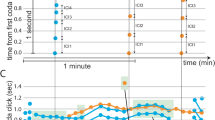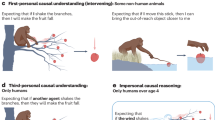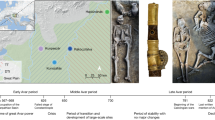Abstract
Some of the most fundamental questions concerning our evolutionary origins, our social relations, and the organization of society are centred around issues of altruism and selfishness. Experimental evidence indicates that human altruism is a powerful force and is unique in the animal world. However, there is much individual heterogeneity and the interaction between altruists and selfish individuals is vital to human cooperation. Depending on the environment, a minority of altruists can force a majority of selfish individuals to cooperate or, conversely, a few egoists can induce a large number of altruists to defect. Current gene-based evolutionary theories cannot explain important patterns of human altruism, pointing towards the importance of both theories of cultural evolution as well as gene–culture co-evolution.
This is a preview of subscription content, access via your institution
Access options
Subscribe to this journal
Receive 51 print issues and online access
$199.00 per year
only $3.90 per issue
Buy this article
- Purchase on Springer Link
- Instant access to full article PDF
Prices may be subject to local taxes which are calculated during checkout




Similar content being viewed by others
References
Boyd, R. & Richerson, P. The Nature of Cultures (Univ. Chicago Press, Chicago, in the press)
Kaplan, H., Hill, J., Lancaster, J. & Hurtado, A. M. A theory of human life history evolution: diet, intelligence, and longevity. Evol. Anthropol. 9, 156–185 (2000)
Hill, K. Altruistic cooperation during foraging by the Ache, and the evolved human predisposition to cooperate. Hum. Nat. 13, 105–128 (2002)
Trivers, R. L. Evolution of reciprocal altruism. Q. Rev. Biol. 46, 35–57 (1971)
Axelrod, R. & Hamilton, W. D. The evolution of cooperation. Science 211, 1390–1396 (1981)
Hammerstein, P. in Genetic and Cultural Evolution of Cooperation. Dahlem Workshop Report 90. (ed. Hammerstein, P.) 1–11 (MIT Press, Cambridge, MA, 2003)
Stephens, D. W., McLinn, C. M. & Stevens, J. R. Discounting and reciprocity in an iterated prisoner's dilemma. Science 298, 2216–2218 (2002)
Hauser, M. D., Chen, K. M., Frances, C. & Chuang, E. Give unto others: Genetically unrelated cotton-tamarin monkeys preferentially give food to those who altruistically give food back. Proc. R. Soc. Lond. B (in the press)
Andreoni, J. & Miller, J. Rational cooperation in the finitely repeated prisoner's dilemma: experimental evidence. Econ. J. 103, 570–585 (1993)
Gächter, S. & Falk, A. Reputation and reciprocity: consequences for the labour relation. Scand. J. Econ. 104, 1–26 (2002)
Fehr, E., Fischbacher, U. & Gächter, S. Strong reciprocity, human cooperation, and the enforcement of social norms. Hum. Nat. 13, 1–25 (2002)
Gintis, H. Strong reciprocity and human sociality. J. Theor. Biol. 206, 169–179 (2000)
Batson, D. C. The Altruism Question (Lawrence Erlbaum Associates, Hillsdale, NJ, 1991)
Silk, J. B. Adoption and kinship in Oceania. Am. Anthropol. 82, 799–820 (1980)
Daly, M. & Wilson, M. Evolutionary social-psychology and family homicide. Science 242, 519–524 (1988)
Cameron, L. A. Raising the stakes in the ultimatum game: Experimental evidence from Indonesia. Econ. Inq. 37, 47–59 (1999)
Slonim, R. & Roth, A. E. Learning in high stakes ultimatum games: An experiment in the Slovak republic. Econometrica 66, 569–596 (1998)
Fehr, F., Tougareva, E. & Fischbacher, U. Do High Stakes and Competition Undermine Fairness? Working Paper 125 (Institute for Empirical Research in Economics, Univ. Zurich, 2002)
Bolton, G. & Zwick, R. Anonymity versus punishment in ultimatum bargaining. Game Econ. Behav. 10, 95–121 (1995)
Hoffman, E., McCabe, K., Shachat, K. & Smith, V. Preferences, property rights and anonymity in bargaining games. Game Econ. Behav. 7, 346–380 (1994)
Güth, W., Schmittberger, R. & Schwarze, B. An experimental analysis of ultimatum bargaining. J. Econ. Behav. Organ. 3, 367–388 (1982)
Roth, A., Prasnikar, V., Okuno-Fujiwara, M. & Zamir, S. Bargaining and market behavior in Jerusalem, Ljubljana, Pittsburgh and Tokyo: An experimental study. Am. Econ. Rev. 81, 1068–1095 (1991)
Henrich, J. et al. In search of Homo economicus: behavioral experiments in 15 small-scale societies. Am. Econ. Rev. 91, 73–78 (2001)
Forsythe, R., Horowitz, J. L., Savin, N. E. & Sefton, M. Fairness in simple bargaining experiments. Game Econ. Behav. 6, 347–369 (1994)
Sober, E. & Wilson, D. S. Unto Others—the Evolution and Psychology of Unselfish Behavior (Harvard Univ. Press, Cambridge, MA, 1998)
Bendor, J. & Swistak, P. The evolution of norms. Am. J. Sociol. 106, 1493–1545 (2001)
Fehr, E. & Fischbacher, U. Third party punishment and social norms. Evol. Hum. Behav. (in the press)
Fehr, E., Kirchsteiger, G. & Riedl, A. Does fairness prevent market clearing? An experimental investigation. Q. J. Econ. 108, 437–459 (1993)
Berg, J., Dickhaut, J. & McCabe, K. Trust, reciprocity and social history. Game Econ. Behav. 10, 122–142 (1995)
Hayashi, N., Ostrom, E., Walker, J. & Yamagishi, T. Reciprocity, trust, and the sense of control—a cross-societal study. Rational. Soc. 11, 27–46 (1999)
Buchan, N. R., Croson, R. T. A. & Dawes, R. M. Swift neighbors and persistent strangers: a cross-cultural investigation of trust and reciprocity in social exchange. Am. J. Sociol. 108, 168–206 (2002)
Fehr, E., Fischbacher, U., Rosenbladt, B., Schupp, J. & Wagner, G. A nationwide laboratory—examining trust and trustworthiness by integrating behavioural experiments into representative surveys. Schmoller Jahrbuch 122, 519–542 (2002)
Dawes, R. M. Social dilemmas. Annu. Rev. Psychol. 31, 169–193 (1980)
Messick, D. & Brewer, M. in Review of Personality and Social Psychology (ed. Wheeler, L.) (Sage Publ., Beverly Hills, 1983)
Fischbacher, U., Gächter, S. & Fehr, E. Are people conditionally cooperative? Evidence from a public goods experiment. Econ. Lett. 71, 397–404 (2001)
Isaac, R. M. & Walker, J. M. Group-size effects in public-goods provision—the voluntary contributions mechanism. Q. J. Econ. 103, 179–199 (1988)
Ledyard, J. in Handbook of Experimental Economics (eds Kagel, J. & Roth, A.) 111–194 (Princeton Univ. Press, 1995)
Fehr, E. & Schmidt, K. M. A theory of fairness, competition, and cooperation. Q. J. Econ. 114, 817–868 (1999)
Yamagishi, T. The provision of a sanctioning system as a public good. J. Pers. Soc. Psychol. 51, 110–116 (1986)
Ostrom, E., Walker, J. & Gardner, R. Covenants with and without a sword: self-governance is possible. Am. Polit. Sci. Rev. 86, 404–417 (1992)
Sethi, R. & Somanathan, E. The evolution of social norms in common property resource use. Am. Econ. Rev. 86, 766–788 (1996)
Fehr, E. & Gächter, S. Altruistic punishment in humans. Nature 415, 137–140 (2002)
Milinski, M., Semmann, D. & Krambeck, H. J. Reputation helps solve the ‘tragedy of the commons’. Nature 415, 424–426 (2002)
Nowak, M. A. & Sigmund, K. Evolution of indirect reciprocity by image scoring. Nature 393, 573–577 (1998)
Wedekind, C. & Milinski, M. Cooperation through image scoring in humans. Science 288, 850–852 (2000)
Milinski, M., Semmann, D., Bakker, T. C. M. & Krambeck, H. J. Cooperation through indirect reciprocity: Image scoring or standing strategy? Proc. R. Soc. Lond. B 268, 2495–2501 (2001)
Engelmann, D. & Fischbacher, U. Indirect Reciprocity and Strategic Reputation Building in an Experimental Helping Game (Working Paper 132, Institute for Empirical Research in Economics, Univ. Zurich, 2002)
Andreoni, J. & Miller, J. Giving according to Garp: an experimental test of the consistency of preferences for altruism. Econometrica 70, 737–753 (2002)
Thibaut, J. W. & Kelley, H. H. The Social Psychology of Groups (Wiley, New York, 1959)
Bolton, G. E. & Ockenfels, A. Erc: A theory of equity, reciprocity, and competition. Am. Econ. Rev. 90, 166–193 (2000)
Rabin, M. Incorporating fairness into game theory and economics. Am. Econ. Rev. 83, 1281–1302 (1993)
Levine, D. K. Modeling altruism and spitefulness in experiments. Rev. Econ. Dynam. 1, 593–622 (1998)
Falk, A. & Fischbacher, U. Distributional consequences and intentions in a model of reciprocity. Ann. Econ. Stat. 63, 111–129 (2001)
Kiyonari, T., Tanida, S. & Yamagishi, T. Social exchange and reciprocity: confusion or a heuristic. Evol. Hum. Behav. 21, 411–427 (2000)
Rilling, J. K. et al. A neural basis for social cooperation. Neuron 35, 395–405 (2002)
Boyd, R. & Richerson, P. J. The evolution of reciprocity in sizable groups. J. Theor. Biol. 132, 337–356 (1988)
Brown, M., Falk, A. & Fehr, E. Relational contracts and the nature of market interactions. Econometrica (in the press)
Fehr, E. & Henrich, J. in Genetic and Cultural Evolution of Cooperation. Dahlem Workshop Report 90 (ed. Hammerstein, P.) 55–82 (MIT Press, Cambridge, MA, 2003)
Cosmides, L. & Tooby, J. in The Adapted Mind (eds Barkow, J., Cosmides, L. & Tooby, J.) (Oxford Univ. Press, New York, 1992)
Alexander, R. D. The Biology of Moral Systems (Aldine De Gruyter, New York, 1987)
Leimar, O. & Hammerstein, P. Evolution of cooperation through indirect reciprocity. Proc. R. Soc Lond. B 268, 745–753 (2001)
Zahavi, A. Altruism as a handicap—the limitations of kin selection and reciprocity. J. Avian Biol. 26, 1–3 (1995)
Gintis, H., Smith, E. A. & Bowles, S. Costly signaling and cooperation. J. Theor. Biol. 213, 103–119 (2001)
Nowak, M. A., Page, K. M. & Sigmund, K. Fairness versus reason in the ultimatum game. Science 289, 1773–1775 (2000)
Gurven, M., Allen-Arave, W., Hill, K. & Hurtado, M. It's a wonderful life: Signaling generosity among the Ache of Paraguay. Evol. Hum. Behav. 21, 263–282 (2000)
Smith, E. A., Bliege Bird, R. L. & Bird, D. W. The benefits of costly signalling: Meriam turtle hunters. Behav. Ecol. 14, 116–126 (2003)
Williams, G. D. Adaption and Natural Selection: A Critique of Some Current Evolutionary Thought (Princeton Univ. Press, Princeton, 1966)
Aoki, M. A condition for group selection to prevail over counteracting individual selection. Evolution 36, 832–842 (1982)
Long, J. C. The allelic correlation structure of Gainj and Kalam speaking peoples and interpretation of Wright's f-statistics. Genetics 112, 629–647 (1986)
Kelly, R. C. The Nuer Conquest: The Structure and Development of an Expansionist System (Univ. Michigan Press, Ann Arbor, 1985)
Bowles, S., Choi, J.-K. & Hopfensitz, A. The co-evolution of individual behaviours and social institutions. J. Theor. Biol. (in the press)
Henrich, J. & Boyd, R. Why people punish defectors—weak conformist transmission can stabilize costly enforcement of norms in cooperative dilemmas. J. Theor. Biol. 208, 79–89 (2001)
Boyd, R., Gintis, H., Bowles, S. & Richerson, P. J. The evolution of altruistic punishment. Proc. Natl Acad. Sci. USA 100, 3531–3535 (2003)
Gintis, H. The hitchhiker's guide to altruism: Gene-culture co-evolution and the internalization of norms. J. Theor. Biol. 220, 407–418 (2003)
Schotter, A. Decision making with naive advice. Am. Econ. Rev. 93, 196–201 (2003)
Chaudhuri, A. & Graziano, S. Evolution of Conventions in an Experimental Public Goods Game with Private and Public Knowledge of Advice (Working Paper, Department of Economics, Univ. Auckland, 2003)
Harbaugh, W. T., Krause, K. & Liday, S. Children's Bargaining Behavior: Differences by Age, Gender, and Height (Working Paper, Department of Economics, Univ. Oregon, 2000)
Jorgensen, J. G. Western Indians: Comparative Environments, Languages, and Cultures of 172 Western American Indian Tribes (W. H. Freeman, San Francisco, 1980)
Otterbein, K. F. The Evolution of War: A Cross-Cultural Study (Human Relations Area Files Press, New Haven, 1985)
Soltis, J., Boyd, R. & Richerson, P. J. Can group-functional behaviors evolve by cultural-group selection—an empirical-test. Curr. Anthropol. 36, 473–494 (1995)
Bornstein, G. & Ben-Yossef, M. Cooperation in intergroup and single-group social dilemmas. J. Exp. Soc. Psychol. 30, 52–67 (1994)
Acknowledgements
We gratefully acknowledge support by the Ludwig Boltzmann Institute for the Analysis of Economic Growth, by the Swiss National Science Foundation and by the MacArthur Foundation Network on Economic Environments and the Evolution of Individual Preferences and Social Norms. We thank G. Bornstein, S. Bowles, R. Boyd, M. Brewer, J. Carpenter, S. Gächter, H. Gintis, J. Henrich, K. Hill, M. Milinski, P. Richerson, A. Riedl, K. Sigmund, E. A. Smith, D. S. Wilson and T. Yamagichi for comments on the manuscript, and M. Naef, D. Reding and M. Jörg for their research assistance.
Author information
Authors and Affiliations
Corresponding author
Ethics declarations
Competing interests
The authors declare that they have no competing financial interests.
Rights and permissions
About this article
Cite this article
Fehr, E., Fischbacher, U. The nature of human altruism. Nature 425, 785–791 (2003). https://doi.org/10.1038/nature02043
Issue Date:
DOI: https://doi.org/10.1038/nature02043
This article is cited by
-
Disrupting the Dorsolateral Prefrontal Cortex Attenuates the Difference in Decision-Making for Altruistic Punishment Between the Gain and Loss Contexts
Brain Topography (2024)
-
Group environment promotes the third-party punishment for maintaining social fairness: evidence from ERPs and neural oscillations
Current Psychology (2024)
-
Context Modulates Perceived Fairness in Altruistic Punishment: Neural Signatures from ERPs and EEG Oscillations
Brain Topography (2024)
-
Prosocial Behaviour and Antibiotic Resistance: Evidence from a Discrete Choice Experiment
The Patient - Patient-Centered Outcomes Research (2024)
-
The proximate regulation of prosocial behaviour: towards a conceptual framework for comparative research
Animal Cognition (2024)
Comments
By submitting a comment you agree to abide by our Terms and Community Guidelines. If you find something abusive or that does not comply with our terms or guidelines please flag it as inappropriate.



